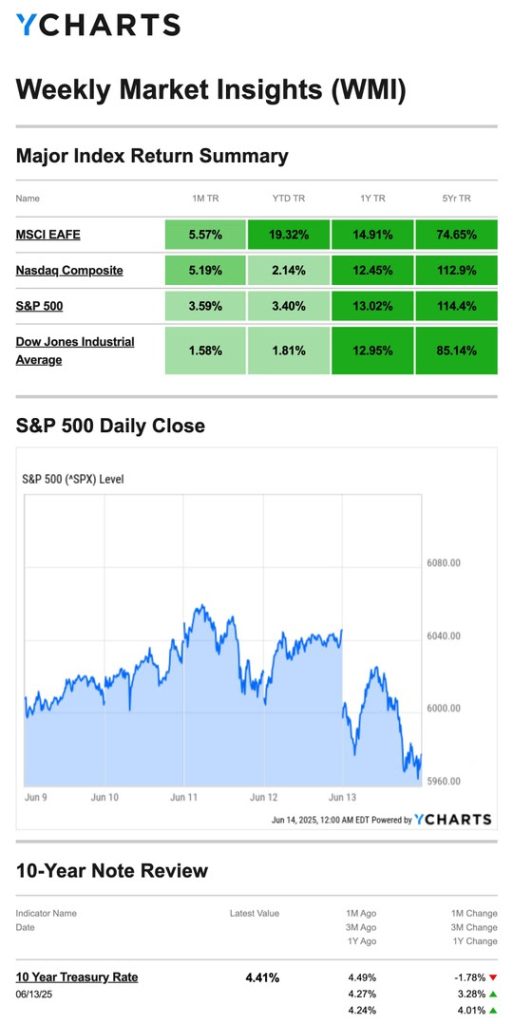By: Gerry Sparrow
Stocks fell last week as an up-and-down mix of trade progress and anxiety, economic news, and geopolitical tensions netted out.
The Standard & Poor’s 500 Index slid 0.39 percent, while the Nasdaq Composite Index slipped 0.63 percent. The Dow Jones Industrial Average declined 1.32 percent. The MSCI EAFE Index, which tracks developed overseas stock markets, edged down 0.18 percent.1,2
Trade, Geopolitics Dominate Sessions
Stocks largely languished for the first half of the week as investors awaited news from U.S.-China trade talks and key inflation reports.3,4
Sentiment began to rise late Tuesday afternoon following upbeat comments about trade talks. Most of the market gains came before the U.S. and China separately announced the trade update, with little reaction when markets opened the next day.4
Stocks peaked midweek, then declined despite a May report showing consumer inflation rose less than expected. Markets then trended a bit higher after a better-than-expected wholesale inflation report.5 Beginning Friday morning, all three averages were under pressure all day following news of an escalated conflict in the Middle East. Oil prices pushed higher on Friday on supply concerns.6

Source: YCharts.com, June 14, 2025. Weekly performance is measured from Monday, June 9, to Friday, June 13. TR = total return for the index, which includes any dividends as well as any other cash distributions during the period. Treasury note yield is expressed in basis points.
Brighter Notes
As the week ended with rising tensions in the Middle East, it was easy to overlook some good economic news.
First is inflation: both the Consumer Price Index (CPI) and the Producer Price Index (PPI) showed signs of cooling or holding steady. And both the CPI and PPI slightly beat expectations.
Second, consumers. Consumer sentiment jumped in May—the first such rise in six months. Economists took note, as consumer spending drives two-thirds of the U.S. economy.7
This Week: Key Economic Data
Tuesday: Retail Sales. Industrial Production. Capacity Utilization. Business Inventories. Homebuilder Confidence Index. Federal Open Market Committee (FOMC) Meeting, Day 1.
Wednesday: Housing Starts. Building Permits. Jobless Claims (weekly). Federal Open Market Committee (FOMC) Meeting, Day 2. Fed Chair Powell Press Conference.
Friday: Leading Economic Indicators.
Source: Investors Business Daily – Econoday economic calendar; June 13, 2025
The Econoday economic calendar lists upcoming U.S. economic data releases (including key economic indicators), Federal Reserve policy meetings, and speaking engagements of Federal Reserve officials. The content is developed from sources believed to be providing accurate information. The forecasts or forward-looking statements are based on assumptions and may not materialize. The forecasts also are subject to revision.
Originally posted on June 17, 2025
PHOTO CREDIT: https://www.shutterstock.com/g/EgorovArtem
VIA SHUTTERSTOCK
FOOTNOTES AND SOURCES
1. WSJ.com, June 13, 2025
2. Investing.com, June 13, 2025
3. CNBC.com, June 9, 2025
4. WSJ.com, June 10, 2025
5. CNBC.com, June 12, 2025
6. CNBC.com, June 13, 2025
7. WSJ.com, June 13, 2025
DISCLOSURES
Investing involves risks, and investment decisions should be based on your own goals, time horizon, and tolerance for risk. The return and principal value of investments will fluctuate as market conditions change. When sold, investments may be worth more or less than their original cost.
The forecasts or forward-looking statements are based on assumptions, may not materialize, and are subject to revision without notice.
The market indexes discussed are unmanaged, and generally, considered representative of their respective markets. Index performance is not indicative of the past performance of a particular investment. Indexes do not incur management fees, costs, and expenses. Individuals cannot directly invest in unmanaged indexes. Past performance does not guarantee future results.
The Dow Jones Industrial Average is an unmanaged index that is generally considered representative of large-capitalization companies on the U.S. stock market. Nasdaq Composite is an index of the common stocks and similar securities listed on the NASDAQ stock market and is considered a broad indicator of the performance of technology and growth companies. The MSCI EAFE Index was created by Morgan Stanley Capital International (MSCI) and serves as a benchmark of the performance of major international equity markets, as represented by 21 major MSCI indexes from Europe, Australia, and Southeast Asia. The S&P 500 Composite Index is an unmanaged group of securities that are considered to be representative of the stock market in general.
U.S. Treasury Notes are guaranteed by the federal government as to the timely payment of principal and interest. However, if you sell a Treasury Note prior to maturity, it may be worth more or less than the original price paid. Fixed income investments are subject to various risks including changes in interest rates, credit quality, inflation risk, market valuations, prepayments, corporate events, tax ramifications and other factors.
International investments carry additional risks, which include differences in financial reporting standards, currency exchange rates, political risks unique to a specific country, foreign taxes and regulations, and the potential for illiquid markets. These factors may result in greater share price volatility.
Please consult your financial professional for additional information.
This content is developed from sources believed to be providing accurate information. The information in this material is not intended as tax or legal advice. Please consult legal or tax professionals for specific information regarding your individual situation. This material was developed and produced by FMG Suite to provide information on a topic that may be of interest. FMG is not affiliated with the named representative, financial professional, Registered Investment Advisor, Broker-Dealer, nor state- or SEC-registered investment advisory firm. The opinions expressed and material provided are for general information, and they should not be considered a solicitation for the purchase or sale of any security.
Important Risk Information
Investing involves risk. Principal loss is possible.
If the adviser’s perceptions of a company’s growth potential are wrong, the securities purchased may not perform as expected, reducing the Fund’s return. Investments in small and midcap companies generally have greater risk and volatility. Diversification does not assure a profit or protect against a loss in a declining market.
The fund’s investment objectives, risks, charges and expenses must be considered carefully before investing. The prospectus contains this and other important information about the investment company, and it may be obtained by calling 888-727-3301 or visiting www.sparrowcapital.com. Read it carefully before investing.




